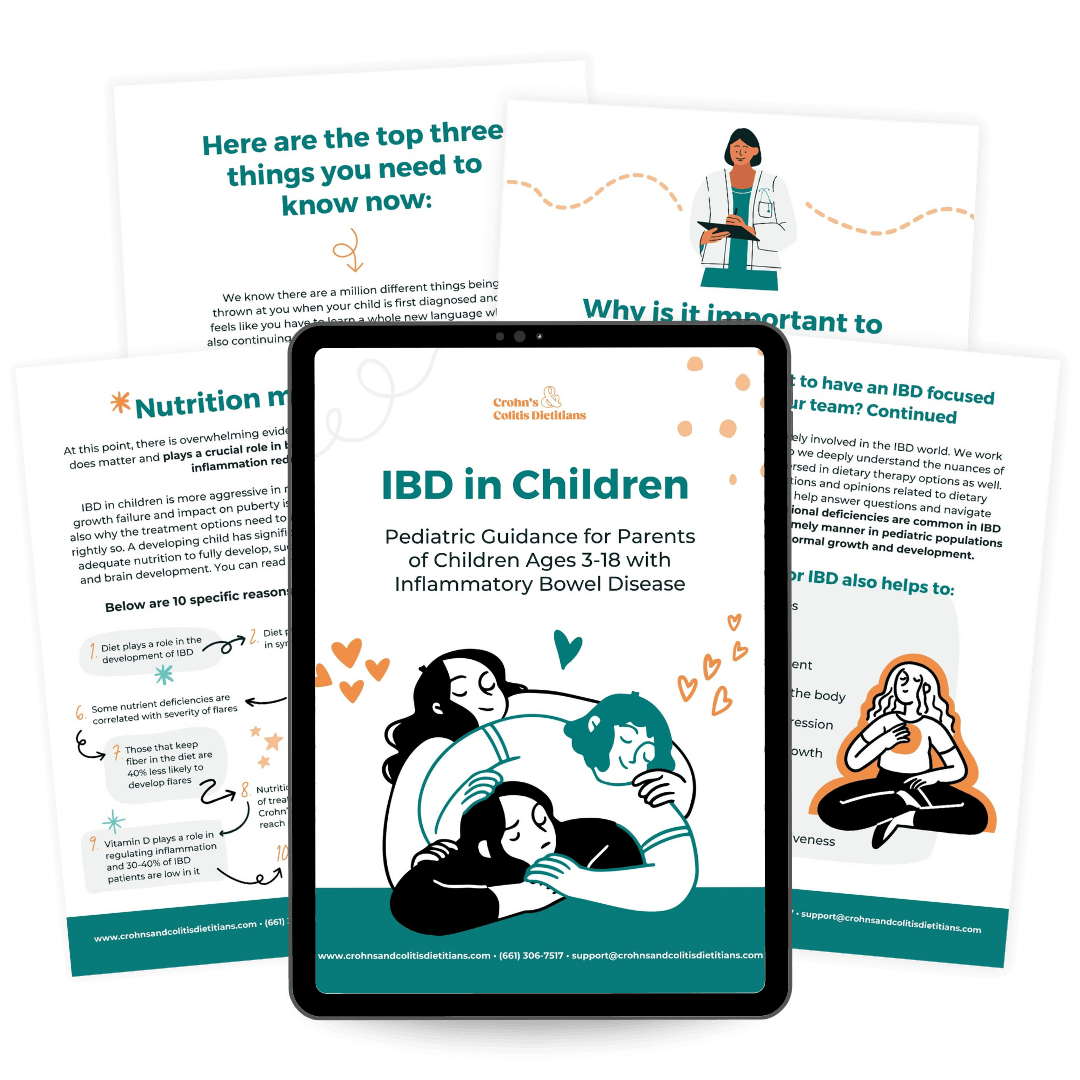Pediatric IBD is scary for any parent to navigate, especially if the parent doesn’t have any prior knowledge or experience with the disease. We have seen these challenges first hand with our clients and want to provide some words of comfort and wisdom.
IBD in pediatric populations is growing worldwide, with about 20-25% of diagnoses happening before the age of 20 (2). The treatment of IBD in children presents many unique challenges due to the differences in the nature of the disease. Not to mention, can we all admit how difficult it is to figure out what a child is saying to us when they describe their symptoms?
It takes a high degree of suspicion and skill to properly diagnose pediatric IBD, which is why we recommend building a highly skilled, specialized team of practitioners to support your journey!
Today we are going to discuss several factors that contribute to the uniqueness of pediatric IBD, the nutrition options available and what we know about them, and what you can do as a parent to help.
Pediatric IBD
What are the warning signs of pediatric IBD?
IBD occurs when there is a perfect storm of an opportunistic environment, an inappropriate immune response, and/or a genetic predisposition.
The most classic symptoms of Crohn’s Disease in children and adolescents are:
- Abdominal pain
- Diarrhea
- Weight loss
Similarly, bloody diarrhea is the most common presentation of Ulcerative Colitis in pediatrics.
Although children can present with the classic symptoms of weight loss, abdominal pain, and bloody diarrhea, many present with nonclassic symptoms of isolated poor growth, anemia, or other extraintestinal manifestations (3).
Extraintestinal manifestations are seen in about a quarter of pediatric IBD patients and typically warn of increasing disease activity (1). Common symptoms include:
- Joint stiffness
- Canker sores in the mouth
- Erythema nodosum
Does pediatric IBD differ from adults?
IBD in children is more aggressive in nature, which is why so much growth failure and impact on puberty is seen in this population. This is also why the treatment options need to be more aggressive as well, and rightly so. A developing child has significant body processes that rely on adequate nutrition to fully develop. Such as bones, hormones, growth, and brain development.
One reason why pediatric IBD is more aggressive is due to the gut barrier function not being as developed as an adult and therefore the response to pathogens is quite different (5). This also means that the course of the disease process can be much different as well, causing more damage and therefore more risk in developing narrowing or blockages in the digestive tract.
Consequences of poor treatment
Managing pediatric IBD to prevent long-term consequences is important (2). Inadequate attention to growth, puberty or bone health in childhood can result in:
- Increased fracture risk
- Impaired adult height
- Delayed puberty and menarche
What are the nutrition treatment options for pediatric IBD?
There are many nutrition options available to those with IBD, including specialized diets used in adult populations as well as more aggressive treatments like exclusive enteral nutrition (EEN).
EEN in pediatric IBD has been found to be as effective as corticosteroids in achieving clinical remission in acute severe ulcerative colitis. Notably, EEN also achieved better mucosal healing and growth than corticosteroids in children with acute severe ulcerative colitis (4).
Because EEN shouldn’t be used long-term, it’s typically used initially to achieve remission and then discontinued. For long-term management, we recommend a plant-forward approach with a Mediterranean diet pattern.
What can you do as a parent?
Many parents come to us with anxious questions full of worry for their children. And who wouldn’t? We know that if you could take this pain away from your child, you would. And we would too. But, it’s in their best interest (and yours) to be as supportive and upbeat as possible.
Remember, it’s not your fault that this diagnosis happened. And all you can do is help them navigate their treatment, make good decisions based on what you know, and build a great team of specialists to help you along the way.
If you’re searching for ways to help your child with IBD, we recommend starting with our free pediatric-focused IBD in Children starter guide. We created this guide for parents of children with IBD (ages 3-18) to help them navigate the diagnosis and provide helpful next steps in creating a sustainable treatment plan for their child or teen with inflammatory bowel disease.

Get our free guide for parents who have a child or teen with IBD
After years of working with children with IBD and their parents, there are a handful of things we know.
Here are the ways you can best support your child with and through their IBD diagnosis:
Provide a safe space
Your child needs to know that it’s going to be okay and when they feel like it’s not, that you will be there with open arms. Carve out time for them to debrief with you about their diagnosis, their treatment, their medications, how they are feeling, and how they want you to support them.
Listen empathetically
Empathy is the ability to understand and share in the feeling of another person, basically the definition of a parent right? As you carve out space for your child to talk, listen more than you speak. Try, as best you can, to see life through their eyes.
Ask questions
As you listen empathetically, ask clarifying questions so that you can understand what it feels like to live with this diagnosis. Try to understand what they mean by their symptoms, what it feels like, and where the pain is located. This will help you better advocate for them. Oh, and never hesitate to provide snuggles along the way!
Don’t try to be the practitioner
We see parents trying to be dietitians a lot. And honestly, parent to parent, this is NOT in the best interest of the child. You can make assumptions about your child but it often doesn’t align with what the child needs and wants. This is particularly true when we work with adolescents and their parents are the ones making and enforcing all of the dietary goals. Typically the teen becomes frustrated with the parent, loses their sense of autonomy, and ultimately doesn’t make any impactful changes to help their disease process. As parents we can support, but we can’t force. They need to see and enjoy you as a parent, not as part of the negative associations of this diagnosis.
Be a patient advocate
Even adults need patient advocates, so having a great patient advocate as a parent is such a gift to the child (that they probably don’t even realize yet)! You can help the child describe symptoms to providers, ask deeper questions, administer medications appropriately, support your child through infusions or procedures, and so much more.
Build a highly skilled, specialized treatment team
As mentioned before, you don’t need to be a practitioner, which means you need to build a really skilled, specialized team of professionals that will help you navigate the IBD road ahead. You and your child need to be able to trust your team and ask questions so that you all feel supported and safe.
Learn and build health literacy skills with your child
Never stop learning! Learning about IBD itself, all the available options to your child, and health literacy skills will prove to be so helpful for you and your child.
Let go of guilt and shame – it’s NOT your fault
If there is one thing we hope you take away from this, it’s that your child’s diagnosis is not your (or your child’s) fault. There are so many factors at play, no need to add guilt and shame to the mix!
Final Thoughts
Pediatric IBD is a growing issue in Westernized countries. It is complicated, scary, and nuanced. Parent involvement in the disease process is necessary, yet also tricky. Parents cannot and should not be the practitioner.
If you’re unsure of where to start or you’d like to take an active role in helping your family navigate IBD, we recommend starting with our free guide for parents: IBD in Children. Grab it above or by clicking here. If you want to dive deeper, we’ve developed a program specifically for parents and children with IBD. You can learn more about that here.
You need the help of specialists who can help you navigate the murky waters of IBD nutrition and help you advocate for your child all without bias. Your child needs the help of specialists so that they enjoy you as a parent, not see you as part of the negative of their diagnosis.
It may seem unfortunate that you have to walk this road, but you are not alone and truly this diagnosis provides so much more than you could imagine! If you are struggling to figure out a pediatric IBD diagnosis or are ready to add a specialized dietitian to your team, reach out here or learn more about our pediatric IBD program here. We are currently taking new clients and would be honored to help you!
References:
- Grover Z, De Nardi A, Lewindon PJ. Inflammatory bowel disease in adolescents. Aust Fam Physician. 2017;46(8):565-571. PMID: 28787555.
- Lev-Tzion R, Turner D. Is pediatric IBD treatment different than in adults? Minerva Gastroenterol Dietol. 2012 Jun;58(2):137-50. PMID: 22643596.
- Rosen MJ, Dhawan A, Saeed SA. Inflammatory Bowel Disease in Children and Adolescents. JAMA Pediatr. 2015 Nov;169(11):1053-60. doi: 10.1001/jamapediatrics.2015.1982. PMID: 26414706; PMCID: PMC4702263.
- Sahu P, Kedia S, Vuyyuru SK, Bajaj A, Markandey M, Singh N, Singh M, Kante B, Kumar P, Ranjan M, Sahni P, Panwar R, Sharma R, Das P, Makharia G, Travis SPL, Ahuja V. Randomised clinical trial: exclusive enteral nutrition versus standard of care for acute severe ulcerative colitis. Aliment Pharmacol Ther. 2021 Mar;53(5):568-576. doi: 10.1111/apt.16249. Epub 2021 Jan 13. Erratum in: Aliment Pharmacol Ther. 2021 Nov;54(9):1224-1227. PMID: 33440046.
- Terciolo C, Dapoigny M, Andre F. Beneficial effects of Saccharomyces boulardii CNCM I-745 on clinical disorders associated with intestinal barrier disruption. Clin Exp Gastroenterol. 2019 Feb 11;12:67-82. doi: 10.2147/CEG.S181590. PMID: 30804678; PMCID: PMC6375115.




0 Comments